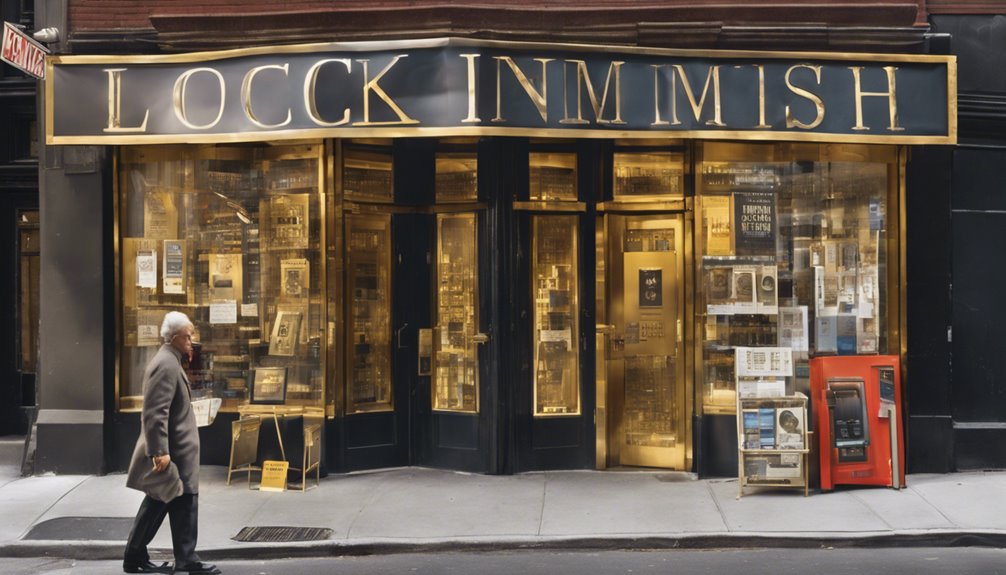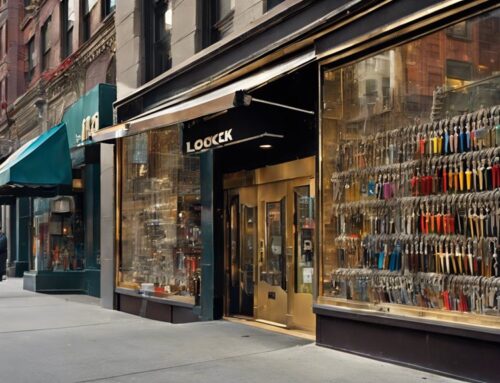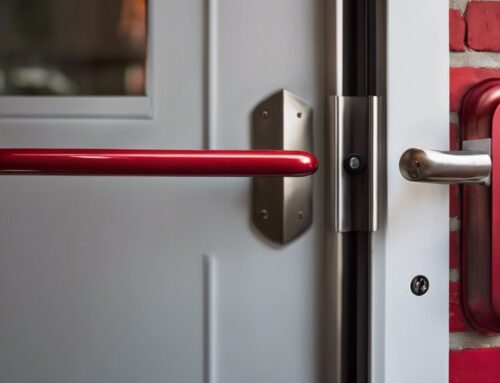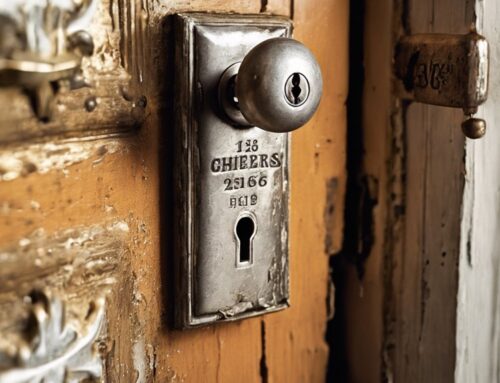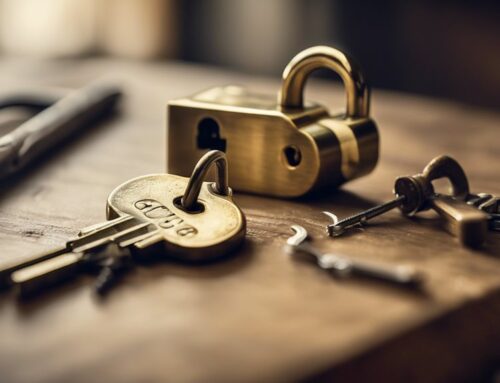Imagine a New York locksmith who falsely advertises a $50 lockout service only to charge $200 upon arrival. You'd likely question not just their pricing but their integrity as well. Maintaining ethical standards and adhering to advertising regulations isn't just about compliance; it's about building trust and a solid reputation in a competitive market. So, what happens when these standards are disregarded? The implications can extend far beyond immediate profits, affecting both client relationships and long-term business sustainability.
Key Takeaways
- Transparency in communications, including clear pricing and honest service descriptions, is essential for building client trust in ethical locksmith practices.
- Compliance with New York's licensing requirements is mandatory; include your license number in all advertising to avoid legal penalties.
- Non-destructive entry techniques should be prioritized, enhancing client satisfaction and demonstrating commitment to ethical service delivery.
- Honest advertising practices are crucial to prevent legal repercussions, such as fines and license revocation, from misleading marketing claims.
- Ongoing education and adherence to industry standards are vital for maintaining expertise and ethical practices in the locksmith field.
Client Confidentiality Standards

While your personal information is necessary for locksmith services, ensuring client confidentiality remains a top priority. Collecting your name, email address, phone number, and address is crucial for effective service; however, this data must be handled with care. The locksmith service's privacy policy governs how your information is used, emphasizing that it shouldn't be shared with third parties without your consent. Additionally, the policy highlights the importance of safeguarding personal information during your interactions with the website. Operating without a license can increase the risk of legal repercussions that may compromise client confidentiality. Compliance with employment laws is also vital as it protects both the locksmith and the client.
You have rights when it comes to your data. You can access your information, request corrections, or even ask for it to be deleted. You're also free to withdraw consent for data processing whenever you choose. Exercising these rights is straightforward—just contact the locksmith service directly.
While specific regulations for client confidentiality may not exist in locksmithing, businesses must still comply with general practices to protect your data. In New York City, locksmith licensing is mandatory, and maintaining a standard of confidentiality aligns with good business ethics.
Keeping your information safe is imperative, especially since any unauthorized disclosure could lead to embarrassment or worse. Locksmith services should take reasonable steps to prevent such occurrences. They mightn't have formal best practices, but implementing secure communication protocols and security measures are crucial.
Finally, remember that while locksmiths may share information due to legal requirements or during mergers and acquisitions, you deserve assurance that your privacy is respected. Opting for services that prioritize confidentiality can give you peace of mind.
Prioritizing Non-Destructive Entry

Maintaining client confidentiality is important for locksmith services, but equally essential is the commitment to non-destructive entry methods. This approach not only respects your clients' property but also guarantees their trust and satisfaction.
Utilizing techniques such as bypasses, lock picking, and other specialized tools allows for access without causing damage. When you employ electronic locks and keypads, you provide alternative solutions that enhance security without compromising the integrity of existing fixtures. Tools like the BADAXX Unforcer are designed specifically to facilitate non-destructive entry. Furthermore, locksmiths engaged in eviction processes must adhere to legal guidelines surrounding eviction procedures to ensure compliance and protect all parties involved. It's important to remember that proper master key system management involves both security and compliance.
It's vital to exhaust all non-destructive methods before considering more invasive techniques. By doing so, you demonstrate respect for your clients' investments, saving them potential repair costs and maintaining the functionality of their locks.
This practice isn't merely ethical; it aligns with New York City regulations that mandate locksmiths to operate without destroying locks.
Your service should emphasize training in non-destructive entry for all employees. This specialized skill set not only broadens your service capabilities but positions you as a leader in the locksmith industry.
Offering 24-hour emergency services that prioritize non-destructive methods enhances customer loyalty and builds a reputation grounded in trust.
Documenting the techniques used and complying with local regulatory requirements also fortifies your standing as a professional. By demonstrating your commitment to non-destructive practices, you'll not only protect client property but also showcase a business philosophy rooted in integrity and customer care.
Prioritizing non-destructive entry is more than just a service; it's a commitment to ethical, responsible locksmithing.
Upholding Professionalism and Integrity
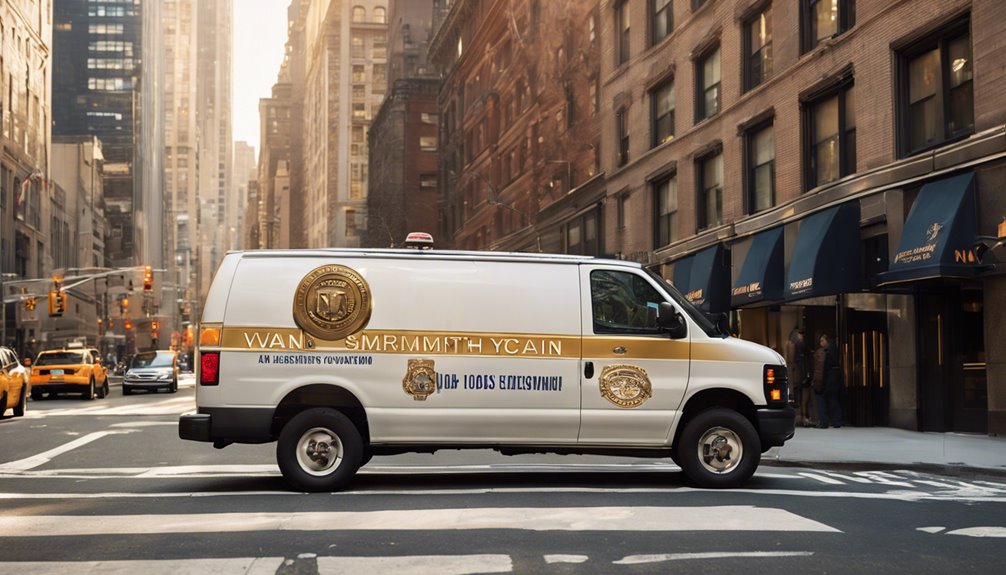
Upholding professionalism and integrity is essential for locksmiths to foster a trustworthy relationship with clients. These values not only enhance your reputation but guarantee that your clients feel secure and respected. As a locksmith, it's your responsibility to conduct business honestly and transparently. Providing accurate information about services and pricing prevents misunderstandings and builds trust, avoiding pitfalls like price gouging. Moreover, developing a clear understanding of liability management can help you mitigate unforeseen risks associated with the industry. Additionally, ensuring ADA compliance is crucial for making your services accessible to all clients, which further demonstrates your commitment to ethical standards.
You should also handle client information with care to guarantee confidentiality. This involves implementing secure data storage and training your employees on confidentiality protocols. Respecting client privacy is paramount, so avoid disclosing any sensitive information without proper authorization.
To help you navigate this complex landscape, consider the following table outlining key aspects of professionalism and integrity:
| Aspect | Importance |
|---|---|
| Client Confidentiality | Protects sensitive information and builds trust. |
| Honest Communication | Enhances transparency, preventing price issues. |
| Proper Authorization | Safeguards against fraud and upholds legal standards. |
Importance of Continuing Education

Continuing education is essential for you as a locksmith to stay current with the latest technologies and industry standards.
By engaging in ongoing training, you not only enhance your technical skills but also strengthen your ethical practices and compliance with regulations. Understanding the differences between rekeying and replacing locks can also be a vital part of your education, as it informs your decision-making process in protecting your clients' security.
This commitment to learning ultimately positions you for greater success and credibility in your profession. Additionally, many locksmiths benefit from knowledge of licensing requirements in New York, which can vary significantly and influence professional credibility.
Staying Updated Technologically
As technology evolves at a rapid pace, it's essential for locksmiths to engage in ongoing education to remain competitive and knowledgeable in their field. Ensuring you stay updated on the latest advancements in lock technologies, such as smart locks and electronic security systems, enhances your expertise and marketability. In this digital age, familiarity with emergency locksmith service options is crucial, as it prepares you for various urgent scenarios.
Attending workshops and training programs isn't just a suggestion; it's often a requirement to maintain your certifications. With many certifications needing renewal, you must keep abreast of changing codes and industry standards. Knowledge of door hardware and life safety requirements is critical for compliance and for delivering thorough security solutions.
By participating in focused education, you distinguish yourself from non-certified locksmiths, thereby enhancing your reputation. Practical experience complements your theoretical knowledge. You should accumulate training hours in relevant subjects, ensuring you're adept in servicing various locks and security systems.
In doing so, you fulfill the ongoing education requirements set by institutions like ALOA and NLI. Ultimately, committing to continuous learning not only bolsters your skills but also safeguards your professional credentials, preventing any trouble during certification renewals.
The SAFE Act emphasizes the importance of compliance requirements for locksmiths, making it even more crucial to stay informed.
Stay proactive about your education—it's your key to success.
Enhancing Ethical Practices
To maintain high ethical standards in locksmithing, ongoing education plays an essential role in keeping you informed about new technologies, techniques, and ethical challenges. This commitment not only enhances your skill set but also safeguards your professional integrity.
By participating in continuous learning, you can:
- Stay informed: Understanding new access control technologies and effective techniques is critical to providing excellent service.
- Avoid pitfalls: Being aware of potential ethical issues helps you maintain client trust and prevents harmful missteps.
- Obtain certifications: Specialized training fosters your expertise, resulting in recognized credentials like Certified Licensed Locksmith or Certified Automotive Locksmith.
Many manufacturers and institutions offer online and in-person classes, ensuring flexible options to meet your continuing education requirements.
These courses explore essential topics such as confidentiality, client consent, and non-destructive entry methods—key elements in maintaining ethical standards.
When you prioritize education, you not only empower yourself but also demonstrate a commitment to professionalism and integrity, ultimately benefiting your clients and enhancing your reputation in the field.
Embracing ongoing education secures your position as a trustworthy locksmith dedicated to ethical practices.
Compliance With Industry Standards
While staying compliant with industry standards is essential for your success as a locksmith, continued education offers more than just a path to meet legal requirements. It equips you with the latest tools and techniques needed to excel in a rapidly evolving industry. Just as you guarantee your business meets licensing requirements, ongoing training solidifies your expertise.
Here's a glimpse into the importance of continuing education:
| Benefits of Continuing Education | Requirements to Stay Compliant |
|---|---|
| Stay updated with technologies | Complete 8,000 hours of apprenticeship |
| Enhance your skillset | Pass examinations as needed |
| Improve customer satisfaction | Obtain certifications from recognized bodies |
Whether it's through accredited programs or workshops offered by organizations like the ALOA, you've got options. States may require up to 24 hours of training every three years for license renewal, even if New York City does not. Embrace this opportunity not just to comply, but to empower your skills. In an industry where knowledge is power, don't let complacency hinder your growth. Keep learning and thrive.
Proof of Ownership Requirements
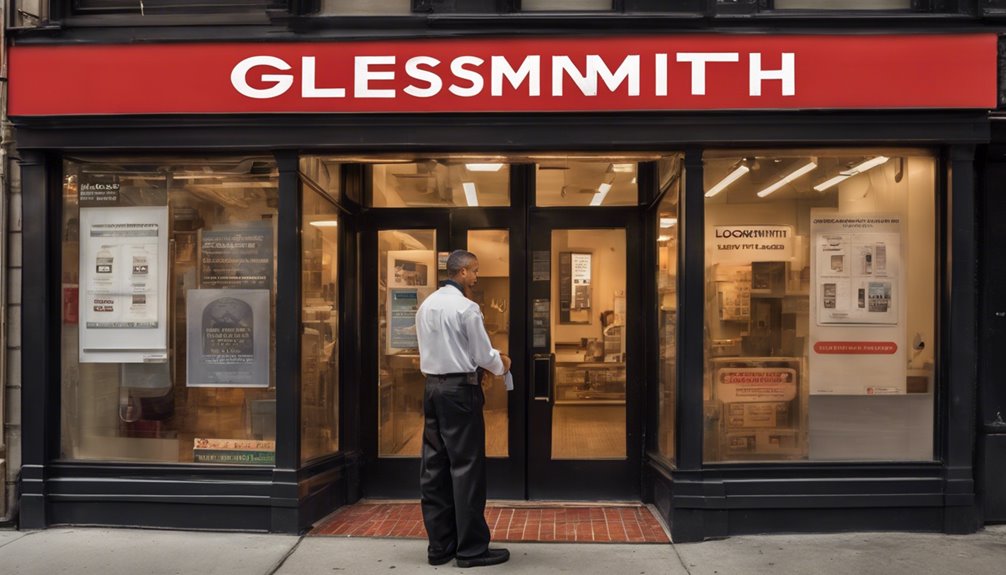
Locksmiths in New York must verify that clients have the right to request services for a specific property or vehicle. This process is vital to protect both you and the locksmith from potential legal issues.
To guarantee a seamless service experience, it's important to provide acceptable proof of ownership. Here are three key documents you should consider having ready:
- State-Issued ID: This verifies your identity and connects you to the property or vehicle.
- Utility Bills or Lease Agreements: These documents must match the service address, confirming your residency or tenancy.
- Vehicle Registration or Title Documents: They establish your legal ownership of the vehicle needing locksmith services.
If you're not the property owner, you'll need to present written authorization from them. This step prevents any unauthorized access to spaces or vehicles.
Remember, failure to provide appropriate proof can lead to service denial as locksmiths are obligated to avoid facilitating unlawful entry.
Be proactive: prepare your documentation in advance to avoid delays. Cooperating with the locksmith's verification process is essential.
Rest assured, while proof of insurance is valuable, it won't suffice alone. Understanding these requirements safeguards your interests and supports locksmiths in maintaining ethical standards.
Advertising Compliance Regulations

When advertising locksmith services in New York, you must include your license number to guarantee compliance with state regulations.
Additionally, you'll need to complete Google's Advanced Verification process, which demands thorough documentation to prove your legitimacy.
Skipping these steps not only jeopardizes your advertising capabilities but also puts your business at risk of account suspension.
License Number Requirement
To guarantee compliance with advertising regulations, all locksmiths in New York must prominently display their license number in every form of communication. This requirement guarantees that consumers can easily verify the legitimacy of locksmith services.
Here are the key media types that require your license number:
- Advertisements: Include your license number in every ad to maintain transparency.
- Receipts and Letterhead: Always display it here, reinforcing trust and accountability.
- Online Platforms: Confirm your website and any electronic ads feature the license number.
Failure to comply can lead to serious consequences, as the Department of Consumer Affairs actively enforces these regulations.
If you operate multiple locations, each location's license number must be correctly identified in all communications. Non-compliance isn't an option; it jeopardizes consumer trust and increases your risk of regulatory action.
Advanced Verification Process
As advertising regulations tighten in New York, the requirement for locksmiths to undergo Google's Advanced Verification process has become mandatory for those wishing to utilize Google Ads.
This process guarantees you're recognized as a legitimate business, safeguarding consumers against fraud. To succeed, you'll need to submit extensive documentation, including your business registration, fictitious name registration if applicable, and a detailed outline of your services, like whether you offer full-service or specialize in car lockouts.
Failing to pass this verification can bar you from running ads, and even attempting to bypass the requirements could lead to account suspension.
Be cautious; adding locksmith-related keywords without verification prompts warnings and ad blocking.
This heightened scrutiny stems from historical issues with fraudulent locksmith ads, which led lawmakers to impose stricter regulations.
Consequently, locksmiths now sit on Google's list of restricted businesses.
Ethical Marketing Practices
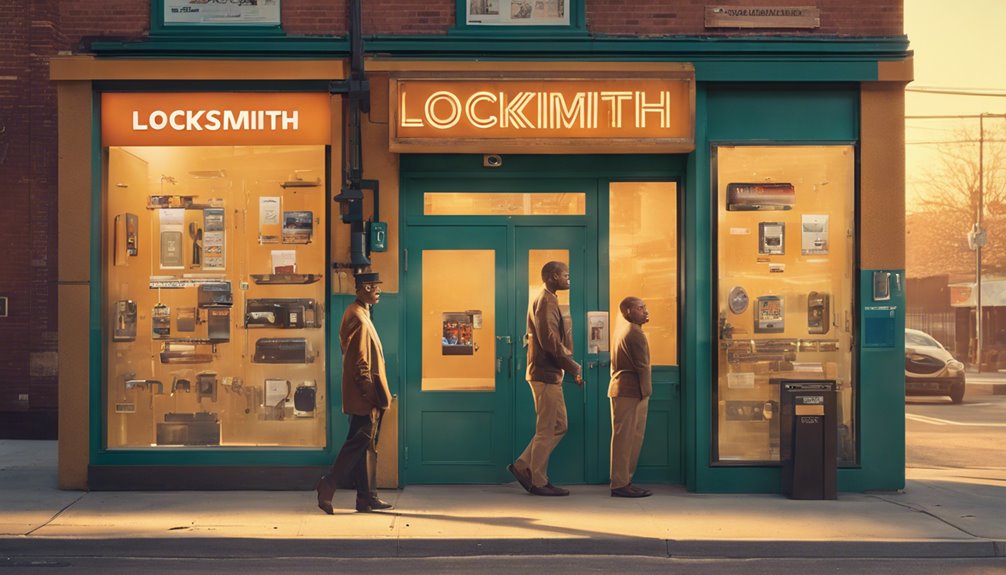
While steering through the competitive landscape of locksmith services, ethical marketing practices are crucial for building trust and fostering long-term relationships with clients. By adhering to ethical standards, you'll not only enhance your reputation but also guarantee that clients feel secure and valued.
Here are three key practices to implement:
1. Client Confidentiality
Handle all client information with the utmost care. Secure data storage, employee training on confidentiality protocols, and strict policies will safeguard clients' privacy and build trust in your services.
2. Transparency in Services
Provide accurate information about your services without resorting to misleading advertising. Avoid overcharging, only recommend necessary repairs, and guarantee that marketing claims are backed by genuine customer reviews. This honesty lays a foundation for trust.
3. Professional Conduct and Consent
Always verify ownership before providing services, and obtain the necessary consent from clients. Respect their decisions regarding property, and maintain thorough records of all authorizations for future reference. Clear communication guarantees that clients feel informed and empowered.
Consequences of Non-Compliance

Non-compliance with advertising regulations can have severe repercussions for locksmiths in New York. If you bypass Google's Advanced Verification, you won't be able to run ads for your services, and any attempts to do so will be automatically blocked. Ignoring these requirements could even lead to your account being suspended or permanently banned from Google Ads, severely limiting your advertising capabilities.
Furthermore, engaging in false or deceptive advertising practices can trigger enforcement actions from New York State's Attorney General. Violating consumer protection laws can carry hefty legal penalties, including fines and potential revocation of your business license. Misleading advertisements couldn't only cost you money but also tarnish your reputation in the marketplace.
On a local level, failing to comply with licensing requirements can lead to fines, legal action, or even closure of your business. Non-adherence to security standards can erode client trust, jeopardizing future work. For unauthorized services, you might face criminal charges, adding another layer of risk to your business.
Lastly, Google strictly enforces its policies, with no exceptions for locksmiths who fail to meet verification checks. Continuous violations of these policies can result in the loss of access to a significant advertising platform.
Frequently Asked Questions
What Are Common Locksmith Scams to Watch Out For?
When hiring a locksmith, watch out for common scams like unbelievably low prices, generic greetings, and insisting on unnecessary repairs.
Be cautious if they demand cash only or provide vague business names. If the technician shows up in an unbranded vehicle without proper identification, that's a red flag.
Always verify credentials, request an itemized estimate, and check reviews to protect yourself from these deceptive practices.
Stay vigilant and informed!
How Can I Verify a Locksmith's License in New York?
Ever felt the frustration of dealing with untrustworthy locksmiths?
To verify a locksmith's license in New York, start with the NYC Department of Consumer Affairs' Instant License Check database.
Simply search their official site or the Public Access Portal for accurate licensing information. You can also call 311 for help.
Always guarantee licensed locksmiths visibly display their credentials, providing you the peace of mind you deserve when securing your property.
What Should I Do if I'm Locked Out of My House?
If you're barred from your house, start by checking for any accessible windows or doors.
If you can't find a way in, wait in a safe, well-lit area while you call a 24/7 locksmith.
Make sure to choose an experienced, licensed professional.
While waiting, keep your valuables secure and stay calm; this'll help you think clearly.
The locksmith should arrive quickly, usually within 30 minutes, to assist you.
Are Locksmith Services Available 24/7 in New York?
Isn't it funny how you can lose your keys yet still expect to find a locksmith at your beck and call?
Thankfully, in New York, locksmith services are indeed available 24/7. Whether you're locked out at midnight or need a lock repaired at noon, technicians are ready to respond.
They cover all five boroughs and prioritize emergency calls, ensuring you regain access quickly and get back to enjoying your freedom.
Can I Change My Locks Myself to Save Money?
You might think changing your locks yourself will save you money, but it can lead to greater expenses down the line.
DIY attempts often cause further damage or security vulnerabilities, potentially requiring expensive repairs or replacements.
Plus, using improper tools can render your locks ineffective, jeopardizing your safety.
Consider hiring a professional locksmith to guarantee the job's done right, maximizing your investment in security and avoiding costly mishaps.
Conclusion
In the world of locksmithing, you can build trust like a master craftsman forges metal. By adhering to ethical standards and advertising regulations, you not only protect your reputation but also guarantee the safety and satisfaction of your clients. Remember, every action and word you choose can spark long-term relationships or ignite controversies. Stay informed, prioritize integrity, and your business will thrive in this competitive landscape. Keep your keys and your ethics aligned for lasting success.

